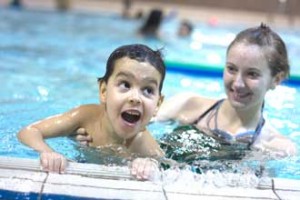
McGill student group wins Forces AVENIR prize
By Neale McDevitt
The kids don’t have much in common. Ranging in age from three to fifteen, they go to different schools and live off Island, around the block and anywhere in-between. And while they are all special needs children, the individual challenges they face range from autism and Down Syndrome to hearing and visual impairment.
But on Sundays they come together, almost 50 of them, in the pool at CEGEP du Vieux-Montréal’s to splash around and smile and feel good about themselves. On Sundays they are swimmers – even though, as recently as September, many couldn’t swim a stroke and some were absolutely terrified of the water.
They are swimmers thanks to Making Waves, a non-profit organization that provides one-on-one swimming instruction for children with special needs. For a mere $20 a semester, each participant receives nine one-on-one lessons with instructors – all of whom are McGill students.
Recently, the ripples made by Making Waves extended beyond the pool as the program was named winner of a prestigious Forces AVENIR prize in the Mutual Aid, Peace and Justice category. Forces AVENIR recognizes, honours and promotes the commitment of young people in projects that contribute to their community and the world.
Matthew Morantz, the group’s president, admits to feeling “a little undeserving” about winning the award because he and the other volunteers derive so much pleasure out of it. “We don’t count the hours we put in because we love it so much,” he said. “It’s just a huge joy to be able to affect a child’s life in such a positive way.”
And the effect is profound. On the purely practical side, Morantz notes that statistically, disabled kids drown at a higher rate than able-bodied children. The basic swimming skills and water safety rules that are taught in each lesson, help ensure that Making Wave swimmers are both more confident and secure when in the water.
“A lot of our kids have conditions that make it really tough for them to exercise because of their limited mobility,” said Morantz. “Swimming not only boosts their self-esteem, it also introduces them to a physical activity that they can participate in for the rest of their lives.”
The self-confidence gained by the swimmers over the course of the program is remarkable, says Mornantz, and being part of that transformation is its own reward. “Some kids come into the program literally running away from the pool,” he said. “By the end, they are usually the kids we have to hold back from jumping in. Its really incredible to have a hand in making that happen.”
Morantz stresses that the kids aren’t the only one benefiting from the program, noting that the bonds forged between teacher and student are lasting. “We develop really strong ties to the kids and we learn some incredible life skills just trying to relate to them,” he said. “Face it, many university students like myself – especially those of us who are living away from home – don’t have a lot of contact with people under the ages of 17-18. In many ways, this helps us relive our childhood. It is pretty amazing.”
The Forces AVENIR win is more than just a feather in the program’s cap, as Morantz hopes the momentum gained will speed up plans to expand Making Waves to campuses across the country. “We already have a new program at McMaster this semester and Dalhousie will kick off theirs in January,” said Morantz. “And I’m talking to people at UBC, U of T and the University of Ottawa right now about starting chapters in January.”
Sometimes the ripples made by even the smallest waves can be felt thousands of miles away.
